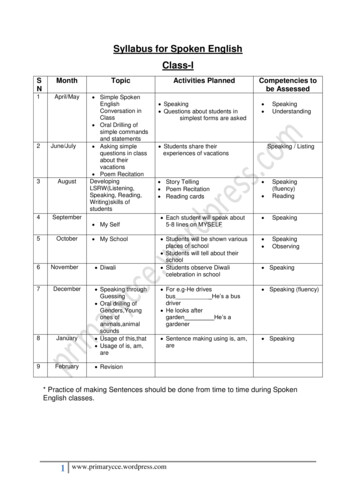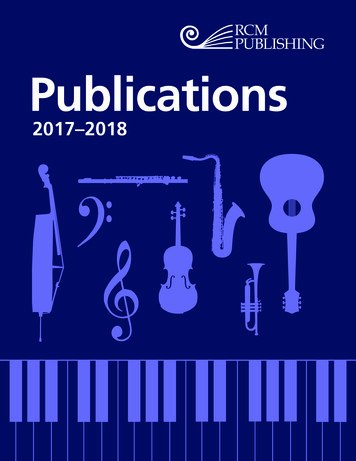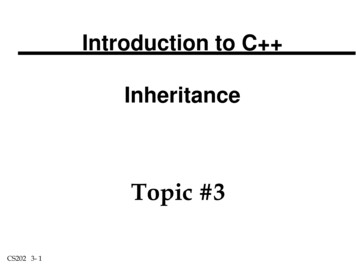
Transcription
Syllabus for Spoken opic Simple SpokenEnglishConversation inClass Oral Drilling ofsimple commandsand statements Asking simplequestions in classabout theirvacations Poem RecitationDevelopingLSRW(Listening,Speaking, Reading,Writing)skills ofstudentsSeptember My Self5October6November7December8January9February My School Diwali Speaking throughGuessing Oral drilling ofGenders,Youngones ofanimals,animalsounds Usage of this,that Usage of is, am,areActivities PlannedCompetencies tobe Assessed Speaking Questions about students insimplest forms are asked Students share theirexperiences of vacations Story Telling Poem Recitation Reading cardsSpeakingUnderstandingSpeaking / Listing Speaking(fluency)Reading Each student will speak about5-8 lines on MYSELF Speaking Students will be shown variousplaces of school Students will tell about theirschool Students observe Diwalicelebration in school SpeakingObserving For e.g-He drivesbus He’s a busdriver He looks aftergarden He’s agardener Speaking (fluency) Sentence making using is, am,are Speaking Speaking Revision* Practice of making Sentences should be done from time to time during SpokenEnglish classes.1www.primarycce.wordpress.com
CLASS 1. FUNCTIONS / AREASVocabulary related to different waysof greetings---In the morning aftergetting up on meeting people, beforegoing to bed. etc.,Introducing yourselfIntroducing people and relationship.Common classroom questions andstatements pertaining to the class.PRONUNCIATIONSIntroduction to phonetic soundsthrough examples.Examples of content:Speaking Situations: Greetings1. Hello.2. Good morning.Good afternoon.Good evening.3. How are you?How are you doing?4. Fine. How about you?5. Okay. Thanks.Vocabulary for Greetings and CourtesyHelloGood morningGood afternoonGood eveningGood nightThank youYou're welcomeExcuse mePardon me(I'm) SorryGood-byeBye.Before we go to bed and when we get up in the morning it's common to make smalltalk about sleeping. Here are the most common phrases used:Before Going to BedGood night.Sleep well.Have a good night's sleep.I hope you sleep well.See you in the morningExample Dialogues2www.primarycce.wordpress.com
Person 1: Good night.Person 2: See you in the morning.Person 1: I hope you sleep well.Person 2: Thank you. Make sure you get a good night's sleep as well.In the Morning, after Getting UpI hope you had a good night's sleep.Did you sleep well?Did you have a good night's sleep?I slept well, how about you?Good morning. Did you sleep well?How did you sleep?Example DialoguesPerson 1: Good morning.Person 2: Good morning. Did you sleep well?Person 1: I hope you had a good night's sleep.Person 2: Yes, thank you I did, and Parent's siblingNephewNieceSibling's oom Questions and StatementsHere are some questions, phrases, and sentences for use in the classroom.What's your name?What is this?What is that?How do you say it in English?How do you spell it?Please say it again.Please speak more slowly/loudly.I don't understand.I'm sorry.May I come in?May I go to the washroom?3www.primarycce.wordpress.com
PRONUNCIATIONEnglish Phonetics - Reference TableVowelsPhoneticExampleSymboltree, sea, we,bit, pit, sitcat, apple, batcar, far, heartball, saw, lawput, foot, could,fool, shoes,move,up, but, blood,her, first, birdabout, away, agobed, head, friendfrock, body, boxDiphthongsPhoneticSymbolExampleeight, make,say,sky, bye, buy, byjoy, coin, boyfear, here, nearhair, care, there,tour, poor,cow, hour, ourjoke, go, though,4www.primarycce.wordpress.com
ConsonantsPhoneticExampleSymbolpark, gap, penboard, tab, abouttent, rest, rentadd, did, dentcord, cat, backgive, agree, flagchance, chart, checkjungle, judge, justfool, if, findfive, give, heaventhanks, think, boththere, other, thenSunday, east, misszebra, zoo, lazyshine, sure, shePleasure, measure ,head, hot,mother, lambnote, ten, nosing, sinklot, leg, littlered, orange; tryyet, yesterday, you,what, wet window5www.primarycce.wordpress.com
Syllabus for Spoken EnglishClass-IISNMonthTopic1April/May Simple Spoken EnglishConversation in Class My Self, My School, MyPetJune/July3August4September Students share theirexperiences of vacations Speaking / Listing Students discuss about theirfriends and get to know themin a better way Students are encouraged togrow more trees Speaking (fluency) SpeakingUnderstanding Students will be shown variouspictures depicting differentfestivals of India SpeakingObserving Role Plays Students will act on short skitson Good manners, cleanliness,moral values Speaking withexpression X-Mas Role play on X-mas Speaking (fluency) Usage of this,that Usage ofis,am,are,has,have,was,were Revision Sentence making using is, am,are,has,have,was,were Speaking My Best Friend Importance of Trees Framing simpleQuestions Forming Plurals Oral drilling of Genders,animal sounds,Youngones of animals5October6NovemberAsking questions to each other inEnglish and answering in thesame language Raksha bandhan Diwali Dasshera7December8January9FebruaryCompetencies to beAssessed Speaking How I spent myvacations Poem Recitation2Activities PlannedSpeakingUnderstanding * Practice of making Sentences should be done from time to time during SpokenEnglish classes.* Oral drilling of similar sounding words6www.primarycce.wordpress.com
FUNCTIONS / AREASCLASS 2. PRONUNCIATIONSVocabulary related to---- asking andgiving informationclassroom questionsIdentifying people and things, describingpeople.Learning about occupationsTalking about favourite things.Use of this,that,these,those Short vowels andconsonantsCommon difficult soundsExamples :- Here are a few simple phrases in EnglishSituation: Learning about OccupationsVocabularyMatch the occupation with the daily activity.Occupation manGardenerChef/CookFire fighterPhotographerActivity catch fishtake picturesfix carscook mealspull teethplant flowersput out firestake care of patientsteach classeswrite news storiesUse the occupations and activities to make conversationsUse of Demonstrative-- This, That, These, ThoseThis orange is sour.These oranges aresweet.That truck is full.Those trucks areempty.I want this one.I want these. (notthese ones)I'll take that one.I'll take those.A: What is this? (Pointing to something held in the speaker's hand or near the speaker)B: A pencil.A: What is that? (Pointing to something at a distance from the speaker)B: A tree.Asking for InformationHere are some sample phrases and sentences for asking information in English1. What is this?2. What is that?3. What's this?4. What's that?5. What are these?6. What are those?7. Where is Mr. Singh?8. Where is Ms. Kanti?7www.primarycce.wordpress.comThis is a table.That is a chair.It's a pen.It's an apple.These are pencils.Those are books.He is over there.She's (right) here.
9. Where's Johnny?10. When's the movie?11. When's lunch?12. How is the food?He's in the house.It's at 9:00.Lunch is at noon.It's delicious.Giving Information1. I work in a post office.2. Greg works in a bank.3. They live in Mumbai4. I eat breakfast at 8:00 a.m.5. She goes to work at 9:00a.m.6. Rohit plays basketball every Friday.7. Pritha starts class at 10:00.Are you a lettercarrier?Is he a teller?Are theyMaharashtrians?What do youeat?No, I'm apostal clerk.Yes, he is.No, they aren't.(I eat) eggs,bacon, andtoast.In theWhere does she cafeteria.work?Where does he At the gym.play?When does she At 11:00.finish?PRONUNCIATIONCOMMON DIFFICULT SOUNDSTH: (long, soft, as in TEETH) Put the tip of your tongue between your teeth andblow gently. It is a long sound and should last about 5 seconds.TH: (short, hard, as in THE) Put the tip of your tongue between your teeth and makea voice sound from your throat. It is a short sound with a sudden burst of air.V: Put your top front teeth onto your bottom lip and make a voice sound in yourthroat. Your lips should be more or less closed.ST: Make a long, soft 'S' sound like a snake, then suddenly add an abrupt 'T schwa'sound by pushing your tongue against the back of your top front teeth, thensuddenly taking it away. (Practise the 's' sound first, then the 'schwa' soundalone before adding the abrupt 'T' sound.)PH: Pronounce PH as F (not P)F: Put your top front teeth onto your bottom lip and blow gently. Your lips should bemore or less closed.H: To make this sound, you need a lot of air and your mouth should be open.Stand or sit up straight and take a deep breath, open your mouth, then let out8www.primarycce.wordpress.com
the air quickly as if you are disappointed about something. Allow your body toslump at the same time.L: When making the L sound, you tongue must temporarily go up to the roof of yourmouth and come down again. It must not touch your teeth unless the nextsoundis TH.R: When making the R sound, your tongue does very little; it just stays at thebottomof your mouth.W: When making the W sound, you must pucker your lips.English Pronunciation Exercises - Short Vowels and Consonantsih –pronounced'ih' as in 'hit'bigpigdidtipgillkillsipzipshipginchiphitee - pronounced eh - pronounced ae - pronounced 'ae''ee' as in 'see''eh' as in 'let'as in g ah' as in 'heart''short ah' as in 'long uh' as in 'put''short uh' as in 'up' 'oo' as in pGoogle9www.primarycce.wordpress.com
thongs10'ou' as in'home''ow' as in'house''oi' as owlcoy(none)Hoist'ay' as in'day''ai' as r)' as in'near''ehi(r)' as in'hair'beerpeerdeartear (drop of water)gearclearseersheerjeercheerbearpeardaretear e.wordpress.com
Syllabus for Spoken Topic Myself My School My Best FriendSeptember How I spent myVacations My favorite cartooncharacter Making pictures of a cartooncharacter Skill (Project) Trees-Importanceand usage Students are encouraged togrow more trees Speaking (fluency) A poem on patriotism Rainy Season Collect information onadvantages anddisadvantages of rain67OctoberNovemberDecemberReadingSpeaking Feeling of Patriotism isinfused in students Compose a short poem offour lines on rainy season5Competencies to beAssessed Collect information about yourfriends Speaking Word Building Students share theirexperiences of vacations Independence Day4Activities PlannedSpeaking / Listing Voice modulation Speaking Creative writingWriting/Speaking Story Narration Students will write story oftheir own choice and narratein class Role play on Moralstories Learning dialogues Speaking with expression Speaking / Listing Importance ofBooks Students are encouraged toread books Speaking (fluency) Write book review Writing Demo of telephoneconversation in class Speaking8January TelephoneConversation9February Revision* Usage of Nouns and Pronouns should be taught in the class.* Practice of making Sentences should be done from time to time during SpokenEnglish classes.11www.primarycce.wordpress.com
CLASS3 . FUNCTIONS / AREASConversations on-----describingpeoplegetting people’s attentionAsking people to repeatAsking for thingsExpressing likes and dislikesPRONUNCIATIONS Pronunciation of silentletters One line tonguetwistersDescribing PeopleHere are some sample sentences and phrases for describing people in English.Personality and Appearance Description1.Tell me about your father.Well, he's very friendly, smart and funny.What kind of person is he?2. What does he look like?He's young, short and handsome.He has straight black hair and green eyes.3. What does your mother look She's tall, thin and beautiful.like?She has grey hair and wears glasses.4. How about your little sister? She has curly red hair and a cute smile.Everybody likes her.Clothing5. What is your brotherHe's wearing light brown pants and anwearing?orange t-shirt.6. What kind of shoes does hehave (on)?Sneakers, and he's wearing white socks.7. Is Susan wearing a dress? No. She's wearing a blue skirt and a yellow8. Anything else?blouse.Yes. She's wearing boots and carrying apurse.Expressing Likes and DislikesHere are some sample phrases and sentences for expressing likes and dislikes.1. I like fruit.What kind?Oranges and2. Helen likes sports.What kind of sports?bananas.3. Ms. Chetna doesn't like Really? Does she like tea? Football and tennis.coffee.Oh. What kind does heYes, she does.4. Tony does not like action like?(He likes) drama.movies.Yes, he does.5. Does Dinesh likeNo, he doesn't.swimming?No, she does not.6. Does Pankaj like softYes, I do.drinks?No, I don't.7. Does Sheila like salad? A little.8. Do you like Chinesefood?Getting People's AttentionIt's common to use 'Excuse me, .' to get someone's attention in English. Another,more formal form is 'I beg your pardon .'12www.primarycce.wordpress.com
Example DialoguesPerson 1: Excuse me, do you know what time it is?Person 2: Yes, it's two o'clock.Person 1: I beg your pardon. Would you minding helping me a moment?Person 2: Certainly. What can I do to help?Asking People to RepeatSometimes, it is important to understand each piece of information when writingdown a telephone number, or taking notes. Here are some phrases which you canuse to ask people to repeat:Would you mind repeating that?Could I read that back to you?Let me repeat that to double-check.Example DialoguesPerson 1: The telephone number is 503 466-3978Person 2: Let me repeat the number to double-check. 503 466-3978Person 1: First, go down 3rd lane to East Street. Take a left, and continue on until you reachHarbor Building.Person 2: Would you mind repeating that?Person 1: Hi, my name is Peter. What's your name?Person 2: Hi, I'm sorry, I didn't catch your name.Asking for ThingsNOT Please give me a penCorrect: Could you give me a pen, please?Example DialoguesPerson 1: Could you hand me that magazine?Person 2: Certainly, here it is.Person 1: Could you lend me a few dollars for lunch, please?Person 2: I'd be happy to do that. How much do you need?You can also ask for things using 'Could I .' with verbs such as 'borrow', 'have', and'use'.13www.primarycce.wordpress.com
Example DialoguesPerson 1: Could I borrow your pen, please?Person 2: Certainly, here you are.Person 1: Could I use that book?Person 2: The red one, or the blue one?Person 1: The blue one. Thank you.PRONUNCIATIONPronunciation - Silent LettersHere is a list of common letter combinations with silent letters. This list contains mostof the silent letters that give English as a second language students difficulties.Silent BB is not pronounced when following M at the end of a word.ClimbcrumbSilent CC is not pronounced in the ending "scle"dumbcombmuscleSilent DD is not pronounced in the following common words:HandkerchiefSilent Elong.sandwichWednesdayE is not pronounced at the end of words and usually makes the vowelHope driveSilent GgavewritesiteG is not often not pronounced when followed by an NChampagneforeignsignfeignSilent GHGH is not pronounced before T and at the end of many wordsThoughtthroughfightweighSilent Hbefore W.H is not pronounced when following W. Some speakers whisper the ight
WhatwhenwherewhetherSilent H"an" withH is not pronounced at the beginning of many words. Use the articleunvoiced H. Here are some of the most common:HourhonesthonorwhyheirherbPronounced HtheH is pronounced at the beginning of these common words. Usearticle "a" with voiced H.HillheighthistoryhappyhangoverSilent KK is not pronounced when followed by N at the beginning of a word.KnifekneeSilent LL is often not pronounced before L, D, F, M, uldSilent NN is not pronounced following M at the end of a word.AutumnhymnSilent PP is not pronounced at the beginning of many words using the suffix"psych" and"pneu".Psychiatrist pneumoniapsychotherapypsychoticSilent SS is not pronounced before L in the following words:IslandisleSilent TT is not pronounced in these common words:CastleChristmasfastenlisten oftenwhistlethistleSilent UU is not pronounced before after G and before a vowel.guessguidanceSilent WW is not pronounced at the beginning of a word followed by an R.15guitarwww.primarycce.wordpress.comguest
WrapwritewrongSilent WW is not pronounced with these three pronouns:WhowhosewhomTongue-twisters in English She sells sea shells by the sea shore.Peter piper picked a peck of pickled peppers.Tom's tom-tom record plays tom-tom music.Ailing Auntie Annie Ames ate apple butter in abundance.Double bubble gum bubbles double.Busy buzzing bumble bees.Chris crashes crimson cars quickly.A cup of proper coffee in a copper coffee cup.Gray geese graze in the green, green grass.Captain Kangaroo's carefully crunching crunchy candy corn.16www.primarycce.wordpress.com
Syllabus for Spoken EnglishClass-IVSNMonth1April/May2June/JulyTopic Simple SpokenEnglishConversation inClass My ambition in life How I spent myVacations Importance ofBooks3August T.V –Advantagesand disadvantages Independence Day4September A poem onpatriotism Rainy Season TelephoneConversationsActivities Planned Speaking Word Building & SentenceBuilding Students share theirexperiences of vacations Reading of any book ofstudents choiceCompetencies tobe Assessed SpeakingSpeaking / Listing Skill (Project)Reading Speaking (fluency) Feeling of Patriotism isinfused in students Voice modulation Collect information onadvantages anddisadvantages of rain Demo by students talkingover phone Speaking TelephoneEttiquates Writing/Speaking Students discuss abouttheir favourite T.V program5October Story Narration6November Role play on Moralstories Students will write story oftheir own choice andnarrate in class Learning dialogues Speaking with expression7December My New YearResolution Students share theirresolutions in the class Speaking (fluency)8January Picture Composition Picture will be shown in theclass and explanation aboutthe picture is given bystudents. Speaking Listing Observing9February Revision Speaking / Listing* Usage of Tenses should be taught in the class.* Practice of making Sentences should be done from time to time during Spoken Englishclasses.* Speaking Topics on Current Affairs can also be included.17www.primarycce.wordpress.com
CLASS 4. FUNCTIONS / AREASTelephoning English------ makinga doctor’s appointmentLeaving a messageAsking a question about bill etc .Descriptions ------- describing afriend, specific wish etc.Talking about events and plans--regarding a holiday, festival etc.Telling timePRONUNCIATIONS Drilling of minimalcontrastsTelephoning EnglishMaking a Doctor's AppointmentComplete ConversationCaller 1: Dr. Pandit’s office. How may I help you?Caller 2: I'd like to make an appointment to see the doctor.Caller 1: Certainly, are you ill at the moment?Caller 2: Yes, I'm not feeling very well.Caller 1: Do you have a fever, or any other symptoms?Caller 2: Yes, I have a slight fever and aches and pains.Caller 1: OK, Dr. Pandit can see you tomorrow. Can you come in the morning?Caller 2: Yes, tomorrow morning is fine.Caller 1: How about 10 o'clock?Caller 2: Yes, 10 o'clock is fine.Caller 1: May have your name?Caller 2: Yes, it's Deven.Caller 1: Have you seen Dr. Pandit before?Caller 2: Yes, I had a physical exam last year.Caller 1: Yes, here you are. OK, I've scheduled for ten o'clock tomorrow morning.Caller 2: Thank you.Caller 1: Drink plenty of warm fluids and get a good night's sleep!Caller 2: Thank you. I'll do my best. Goodbye.Caller 1: Goodbye.18www.primarycce.wordpress.com
Role Play: Caller 1Caller 1: Dr. Pandit’s office. How may I help you?Caller 2:Caller 1: Certainly, are you ill at the moment?Caller 2:Caller 1: Do you have a fever, or any other symptoms?Caller 2:Caller 1: OK, Dr. Pandit can see you tomorrow. Can you come in the morning?Caller 2:Caller 1: How about 10 o'clock?Caller 2:Caller 1: May have your name?Caller 2:Caller 1: Have you seen Dr. Pandit before?Caller 2:Caller 1: Yes, here you are. OK, I've scheduled for ten o'clock tomorrow morning.Caller 2:Caller 1: Drink plenty of warm fluids and get a good night's sleep!Caller 2:Caller 1: Goodbye.Role Play: Caller 2Caller 1:Caller 2: I'd like to make an appointment to see the doctor.Caller 1:Caller 2: Yes, I'm not feeling very well.Caller 1:Caller 2: Yes, I have a slight fever and aches and pains.Caller 1:Caller 2: Yes, tomorrow morning is fine.19www.primarycce.wordpress.com
Caller 1:Caller 2: Yes, 10 o'clock is fine.Caller 1:Caller 2: Yes, it's Deven.Caller 1:Caller 2: Yes, I had a physical exam last year.Caller 1:Caller 2: Thank you.Caller 1:Caller 2: Thank you. I'll do my best. Goodbye.Leaving a MessageComplete ConversationCaller 1: Hello, this is RohiniCaller 2: Hello, this is Richa. May I speak with Anand?Caller 1: I'm afraid Anand isn't in at the moment.Caller 2: Could you take a message?Caller 1: Sure, just a moment let me get a pencil. OK.Caller 2: Great. Can you tell Anand that we're meeting tomorrow at three o'clock.Caller 1: OK . three o'clock meeting with Richa. Does he know where the meetingis?Caller 2: Tell him we'll be meeting in the corner office downtown.Caller 1: Yes, corner office downtown. Is there anything else?Caller 2: I'll leave my telephone number just in case he doesn't have it.Caller 1: OK, I'm ready.Caller 2: Yes, my cell phone number is 939 908 7754.Caller 1: That's 939 808 7754.Caller 2: No, it's 939 908 7754.Caller 1: Ah, sorry.Caller 2: No problem. Thanks for your help.Caller 1: I'll make sure Anand sees this as soon as he gets in tonight.Caller 2: Thank you. Good bye.Caller 1: Good bye.20www.primarycce.wordpress.com
Role Play: Caller 1Caller 1: Hello, this is RohiniCaller 2:Caller 1: I'm afraid Anand isn't in at the moment.Caller 2:Caller 1: Sure, just a moment let me get a pencil. OK.Caller 2:Caller 1: OK . three o'clock meeting with Richa. Does he know where the meetingis?Caller 2:Caller 1: Yes, corner office downtown. Is there anything else?Caller 2:Caller 1: OK, I'm ready.Caller 2:Caller 1: That's 439 808 7754.Caller 2:Caller 1: Ah, sorry.Caller 2:Caller 1: I'll make sure Anand sees this as soon as he gets in tonight.Caller 2:Caller 1: Good bye.Role Play: Caller 2Caller 1:Caller 2: Hello, this is Richa. May I speak with Anand?Caller 1:Caller 2: Could you take a message?Caller 1:Caller 2: Great. Can you tell Anand that we're meeting tomorrow at three o'clock.Caller 1:Caller 2: Tell him we'll be meeting in the corner office downtown.21www.primarycce.wordpress.com
Caller 1:Caller 2: I'll leave my telephone number just in case he doesn't have it.Caller 1:Caller 2: Yes, my cell phone number is 439 908 7754.Caller 1:Caller 2: No, it's 439 908 7754.Caller 1:Caller 2: No problem. Thanks for your help.Caller 1:Caller 2: Thank you. Good bye.Caller 1: Good bye.Telling TimeHere are some sample expressions for telling time in English.7:00It's seven o'clock.It's seven p.m. / a.m.12:00It's twelve o'clock.It's noon / midnight.3:10It's three ten.It's ten (minutes) after three.7:14It's seven fourteen.It's fourteen after seven.9:15It's nine fifteen.It's (a) quarter after nine.1:21It's one twenty-oneIt's twenty-one minutes past one.11:05It's eleven oh five.It's five after eleven.2:09It's two oh nine.It's nine minutes past two.6:30It's six thirty.It's half past six.4:50It's four fifty.It's ten minutes to five.10:45It's ten forty-five.It's quarter to eleven.8:35It's eight thirty-five.It's twenty-five minutes to ninePRONUNCIATIONtear - chairMINIMAL CONTRASTStease – cheesetin – chintop – chopdie tiedin tindoll tolltalk – chalkdeer tear22www.primarycce.wordpress.com
sore – choresum – chumsip – chipsick - chickjeer cheerjoke chokejeep cheapJane chainrat – rashout – ouchwrite – ricecat - catchcore torecape tapecub tuboar coreape capeair careshowerhourshareairshyshake achesoak oaksold oldsat - chatlate - lacecar tarcool toolache cakeold coldeyeseat eat23sad addwww.primarycce.wordpress.com
Syllabus for Spoken English Class-VSNMonthTopic1April/May Simple SpokenEnglishConversation inClass My ambition in life My Hobby How I spent myVacations23June/JulyAugust Importance of CCAin school T.V –Advantagesand disadvantages Debate on theabove topicActivities Planned Speaking Word Building & SentenceBuilding Students share theirexperiences of vacations Students share theirexperiences of participating inCCA Students discuss about theirfavourite T.V program Debate is organized in classSeptember TelephoneConversationsOctober Story Narration Dialogue Writingon any story6November Role play on Moralstories Effects of GlobalWarming My New YearResolution Mobile PhonesAdvantages anddisadvantages PictureComposition Impotance ofMedia Revision7December8January9February SpeakingSpeaking / ListingSpeaking(fluency) Voice modulation Speaking TelephoneEtiquettes Students will write story oftheir own choice and narratein class Students will write a script ingroup Dramatisation of scripts madeby students in class andassembly Learning dialogues Speaking with expression Writing/SpeakingWritingDialogues Students share theirresolutions in the class Debate Speaking(fluency) Demo by students talkingover phone5 Feeling of Patriotism isinfused in students Collect information onadvantages anddisadvantages of rain Independence Day4Competencies tobe Assessed Picture will be shown in theclass and explanation aboutthe picture is given bystudents. Speaking Speaking Listing Observing* Usage of Tenses should be taught in the class.* Practice of making Sentences should be done from time to time in Spoken English classes.* Speaking Topics on Current Affairs can also be included.* Usage of Homophones,Homonyms should be done in class.24www.primarycce.wordpress.com
CLASS5. FUNCTIONS / AREASPractice of dialogues related to --greetings,describing people,ending a conversationleave-takingfavourite musicweatherexpressing concernreceiving visitors etc. PRONUNCIATIONSEnglish ‘long and short’ forms ofvowelsDrilling of the areas ofpronunciations taken up in theprevious classes.Greetings1. A: Hi, how are you doing?B: I'm fine. How about yourself?A: I'm pretty good. Thanks for asking.B: No problem. So how have you been?A: I've been great. What about you?B: I've been good. I'm in school right now.A: What school do you go to?B: I go to DAV.A: Do you like it there?B: It's okay. It's a really big campus.A: Good luck with school.B: Thank you very much.2. A: How's it going?B: I'm doing well. How about you?A: Never better, thanks.B: So how have you been lately?A: I've actually been pretty good. You?B: I'm actually in school right now.A: Which school do you attend?B: I'm attending DAV right now.A: Are you enjoying it there?B: It's not bad. There are a lot of people there.A: Good luck with that.B: Thanks.3. A: How are you doing today?B: I'm doing great. What about you?A: I'm absolutely lovely, thank you.B: Everything's been good with you?A: I haven't been better. How about yourself?B: I started school recently.A: Where are you going to school?B: I'm going to DAV.A: How do you like it so far?B: I like it so far. My classes are pretty good right now.A: I wish you luck.B: Thanks a lot.25www.primarycce.wordpress.com
Describing People1. A: Have you seen the new girl in school?B: No, I haven't.A: She's really pretty.B: Describe her to me.A: She's not too tall.B: Well, how tall is she?A: She's about five feet even.B: What does she look like, though?A: She has pretty light brown eyes.B: I may know which girl you're talking about.A: So you have seen her around?B: Yes, I have.2. A: There's a new girl in school, have you seen her yet?B: I haven't seen her yet.A: I think that she is very pretty.B: Tell me how she looks.A: She's kind of short.B: What height is she?A: She's probably about five feet.B: That's nice, but tell me what she looks like.A: The first thing I noticed was her beautiful brown eyes.B: I think I might've bumped into her before.A: Are you telling me that you've seen her before?B: I believe so.3. A: Have you met the new girl?B: No. Have you?A: She's one of the prettiest girls at the school.B: What does she look like?A: Well, she's quite short.B: How tall would you say that she is?A: I would say she's only five feet.B: What about her facial features?A: She has light brown eyes, absolutely beautiful.B: I think I know who you're talking about.A: Have you seen her?B: I think that I have.Ending a Conversation1. A: It was nice talking to you.B: Why are you trying to rush me off the phone?A: I really have to go.B: Why? I still wanted to talk to you.A: I have things to do.B: Like what?A: Don't be nosey.B: I'm not. I just want to know.26www.primarycce.wordpress.com
A: Well, it's really none of your business.B: That's harsh.A: I'm sorry, but I have to go.B: Fine.2. A: I've enjoyed conversing with you.B: Is there a reason why you're trying to get off the phone so fast?A: I've got to go.B: I wasn't done talking to you.A: I have to do some things, and besides, it's not polite to be nosey.B: I'm not being nosey. I'm just asking.A: I really don't think it's any of y
Syllabus for Spoken English Class-I S N Month Topic Activities Planned Competencies to be Assessed 1 April/May Simple Spoken English Conversation in Class Oral Drilling of simple commands and statements Speaking Questions about students in simplest forms are as










